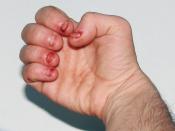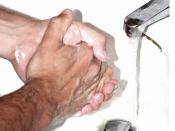AssignmentHeather NeilNovember 9, 2008Axia CollegeImagine living a life where each day you uncontrollably had to wash your hands each time you were to touch a pencil, or had to repeatedly check your house to make sure all of your belongings were in their proper place. Although it sounds crazy, each day about 1 in 50 adults in the United States do live this way. However, it is not their choice. Obsessive-Compulsive Disorder, normally referred to as OCD, is a mental disorder in which a person who suffers from thoughts, images, or impulses out of their control called obsessions, will repeatedly perform ritualistic compulsions in order to get rid of their own obsessive thoughts. Obsessive-Compulsive Disorder can cause severe distress and impair the daily lives of those who suffer from it, yet not all Obsessive-Compulsive behaviors signal an illness. Many people have certain routines which they develop and adhere to each day.
In order to fully understand Obsessive-Compulsive Disorder, one must look at the definitions of obsessions and compulsions and how they affect those living with Obsessive-Compulsive Disorder, what causes it, and how it is treated.
According to the DSM-IV, obsessions are repeated thoughts, images, or impulses that are out of ones control. They seem to be a hassle on the lives of those who experience them, and most of the time does not seem to make much sense. For example, someone living with OCD may worry that they had left the stove on, even though they know that they turned it off. Most obsessive thoughts bring on uncomfortable feelings to those living with OCD, such as fear, doubt, or the idea that things have to be done in a certain way or they won't be right. Most people suffering from OCD recognize their obsessions, and are aware that they...


